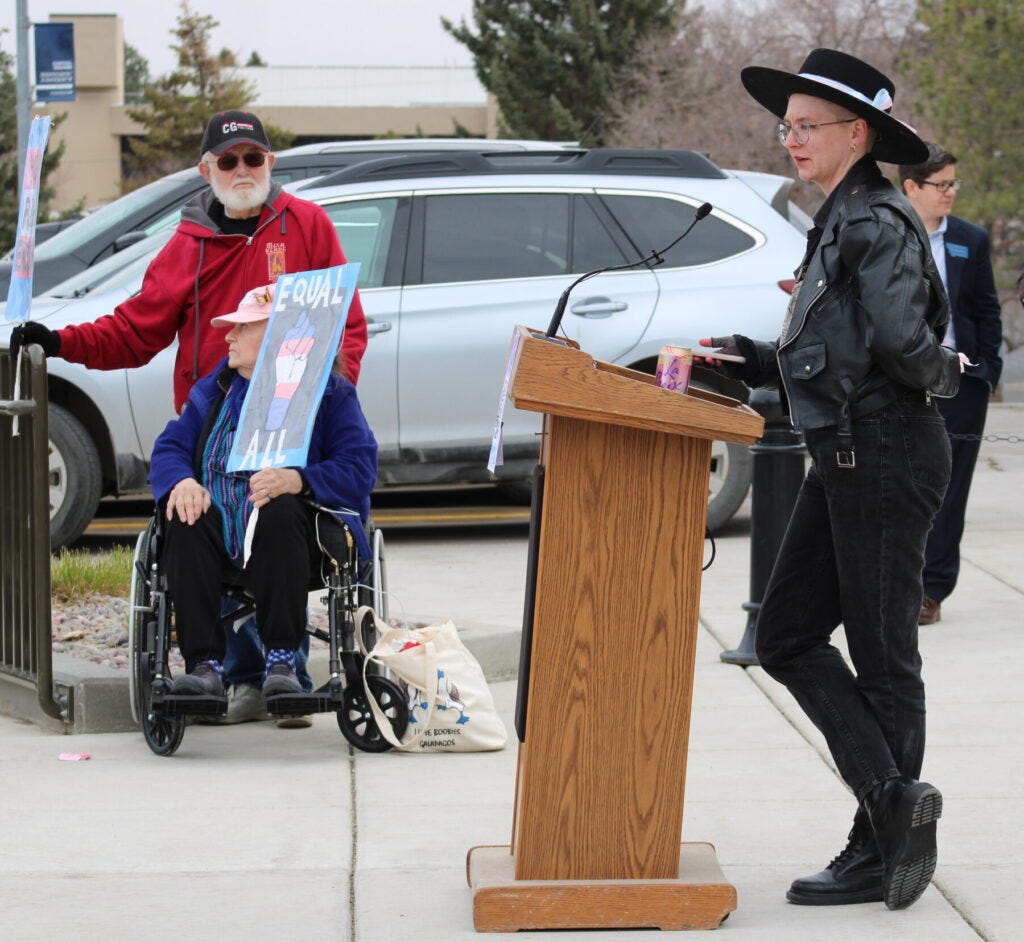‘We Exist in the Future,’ Said Speaker at Transgender Day of Visibility
Four years ago, Bridgette Whiteman said she was dying on the floor of her parents’ basement, an alcoholic “drinking away.”
One in four people who are transgender suffer from alcohol use disorder, she said, and Whiteman kept quiet about her problem, but she’s sober now, besides the occasional celebratory drink.
Whiteman said two years ago, she was homeless in Missoula while finishing her degree, among 19 transgender, nonbinary and Two Spirit people who were reported as unhoused by the Missoula Organization of Realtors at the time — “I can think of at least one that they missed.”
And one year ago, Whiteman was crying and telling her boyfriend she had been raped, and she said two-in-five people who are trans, nonbinary and Two Spirit have experienced sexual violence.
Whiteman said when Representative Zooey Zephyr, D-Missoula, a transgender woman, won her first election, she told Zephyr she wanted to join her at the Capitol.

Monday, Whiteman made good on that promise as part of Transgender Day of Visibility at the Capitol, celebrated with colorful banners, chalk art and chants.
“Visibility matters,” said Whiteman, with TransVisible Montana. “Build support in your community.
“Support your neighbors. Uplift the marginalized in society. We all belong in Montana.”
At the microphone, Julia Maxon, with Catalyst Montana, said the national day commemorating people who are transgender was founded in 2009.
Unlike the day of remembrance in the fall that honors people who are lost to transphobia, Maxon said Trans Day of Visibility is meant to celebrate transgender people who are living.
To a crowd of a few dozen that rallied shortly after a light spring snow, they also said it’s important to acknowledge Indigenous people, whose land is occupied by settlers.
“We want to acknowledge the trans community has always been part of this land in the form of Two Spirit people since time immemorial,” Maxon said.

A banner draped across the steps of the Capitol read, “Trans people belong in Montana.” Other signs of support read, “Trans people cannot be erased,” and “Protect Trans Kids.”
The crowd booed House Bill 121 and House Bill 300, both signed last week by Governor Greg Gianforte and among a multitude of bills that Maxon said would harm people who are transgender, nonbinary or intersex.
Participants cheered the ACLU of Montana for filing a lawsuit against HB 121, which took effect immediately. The national ACLU and Legal Voice also joined in the lawsuit.
HB 121 requires public restrooms and changing areas exclusively for males or females based on “external genitalia present at birth.”
It applies to public schools, correctional centers, domestic violence shelters, and public buildings such as libraries.
HB 300 restricts the ability of transgender women from participating in female sports. Sponsor Representative Kerri Seekins-Crowe, R-Billings, earlier said it would protect the ability of women to receive scholarships, medals and leadership opportunities.
In a statement last week, Gianforte, a Republican, said the legislation was about safeguarding privacy for women and girls and ensuring separate facilities for them.
The bills passed on partisan lines.

“We think it’s pretty simple. A man shouldn’t be in a women’s restroom. Shouldn’t be in a women’s shower room. And shouldn’t be housed in a women’s prison,” Gianforte said.
At the rally, Maxon described the bills as evidence of increasing fascism in the country, threatening people’s bodily autonomy and safety.
“Despite the ongoing state of oppression and violence we are experiencing, we will not be silenced,” Maxon said. “Like all Montanans, we deserve safety, dignity and respect.”
Morgan Syring, with Forward Montana, led the group in a chant and call back.
“What do we do when our bodily autonomy is under attack?” Syring said.
“Stand up. Fight back,” the crowd yelled.
By Keila Szpaller for the Daily Montanan




